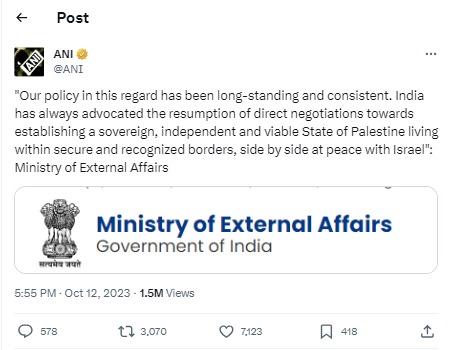
Expressing serious concern over a section of Indian media supporting the Israeli atrocities on the Palestinian people and condemning the Palestinian resistance, young Muslims in higher educational institutions say the Indian media must follow the policies of Mahatma Gandhi and Pandit Jawaharlal Nehru who advocated for an Independent Palestine. Indian Media must not follow its Western counterpart that has been brazenly supporting the Israel’s occupation of Palestine. Here are the views of young Indian Muslims on the issue.
 Abdullah Mohammed Faiz, National Secretary, SIO of India
Abdullah Mohammed Faiz, National Secretary, SIO of India
The reprehensible conduct of certain sections of the Indian media and their alignment with communal and fascist forces in celebrating the suffering of innocent Palestinians while endorsing Israel’s deadly war cry is a despicable low in journalism. This reflects a profound ignorance of the historical complexities of India’s relationship with Palestine and the blatant disregard for international norms and values.
Any individual possessing even a bit of awareness regarding Israel’s consistent violations of UN resolutions and international laws would refrain from such support. Prime Minister Narendra Modi, in hastily announcing his backing of Israel, ought to have considered the numerous times the UN Assembly, UN Security Council, and major international human rights organizations have unequivocally condemned Israel for its wanton acts, unlawful occupation, and incitement of conflict. These international bodies have passed hundreds of resolutions condemning Israel’s tyrannical actions.

It is imperative that Prime Minister Narendra Modi rescind his ill-advised declaration of support and revert to the longstanding Indian tradition upheld by towering leaders such as Mahatma Gandhi, Jawaharlal Nehru, and Atal Bihari Vajpayee and at least honour the statement posted on X by the Ministry of External Affairs.
These statesmen were unwavering supporters of the Palestinian cause and consistently stood against the occupation and apartheid policies of Israel.
This volte-face on India’s principles is a departure from the values that have guided its foreign policy for decades.
 Ammarah Rizwan, Bachelors in English (Hons) II Year
Ammarah Rizwan, Bachelors in English (Hons) II Year
If you’re not careful, the newspapers will have you hating the people who are being oppressed and loving the people who are doing the oppressing.” — Malcolm X
This famous quote surfaces and is shared online during the attacks and barbarism of the recent genocide of Palestinians, which is also referred to as a “conflict” or an “issue between Israel and Palestinians” by the free press or liberal media. One side believes that Hamas conducted the attack deliberately and killed innocent Israeli babies, while other sources completely deny these accusations. The other side believes that the people of Gaza are doing everything to secure their freedom and regain their land, which is illegally occupied by Israeli settlers. Some people prefer to remain neutral and hope for peace for both countries.
As an Indian Muslim, it is the right time to use our voice for the truth and stand with the Palestinians.
For 75 years, Palestinians have been violently dispossessed of their lands and forcibly displaced into the hands of the illegal. People say both sides are bleeding and fighting, but the truth is that one side has nuclear power with billions of dollars worth of military and defense funding, while the other side has been starved, suffocated, and massacred for so many years in their own homes. All the oppressors will have to answer, if not in this life, then in the hereafter, and Allah’s wrath will be upon the zaalimeen.
 Talha Mannan, Research Scholar, Maulana Azad National Urdu University, Hyderabad
Talha Mannan, Research Scholar, Maulana Azad National Urdu University, Hyderabad
The Palestine-Israel conflict has been a long-standing and deeply contentious issue, marked by violence, suffering, and human rights concerns. Recently, the conflict has once again come to the forefront of international attention, with a focus on the perceived oppression of the Palestinian people by Israel. However, it is essential to approach this complex issue with nuance and consideration for all perspectives.
The recent flare-ups in the conflict, particularly the violence and Israel’s almost genocidal attempt towards Gaza, resulted in a tragic loss of innocent lives and destruction. Many argue that Israel’s military actions in response to attacks from Palestinian territories have disproportionately affected civilians, leading to international condemnation and calls for an immediate ceasefire.
In this context, India’s stance on the Palestine-Israel conflict has evolved. Historically, India had maintained a pro-Palestine position, rooted in its solidarity with the Palestinian cause. However, in recent years, there has been a noticeable shift towards an approach that acknowledges Israel’s security concerns while advocating for a just and peaceful resolution. This shift in policy may be attributed to India’s growing strategic ties with Israel.
The Indian media has played a significant role in shaping public opinion on this issue. Some segments of the Indian media have been criticised for sensationalising the conflict and framing it in communal terms.
It is crucial to recognize that the Palestine-Israel conflict is a complex geopolitical issue, and media outlets should strive for responsible reporting that promotes understanding rather than further polarisation.
Unfortunately, in some cases, the Indian media has also been accused of unfairly portraying Indian Muslims who support the Palestinian cause. Such portrayals are not only detrimental to communal harmony within India but also undermine the legitimate right of individuals to express their opinions on global issues.
The Palestine-Israel conflict is a multifaceted and sensitive issue that deserves careful consideration and balanced coverage. India’s evolving stance reflects its changing global dynamics, and it is vital for the media to report on this issue responsibly, avoiding the communalization of the conflict and promoting an atmosphere of dialogue and empathy for all affected parties.




